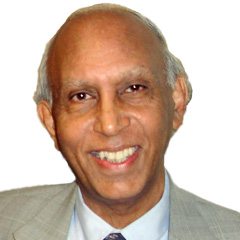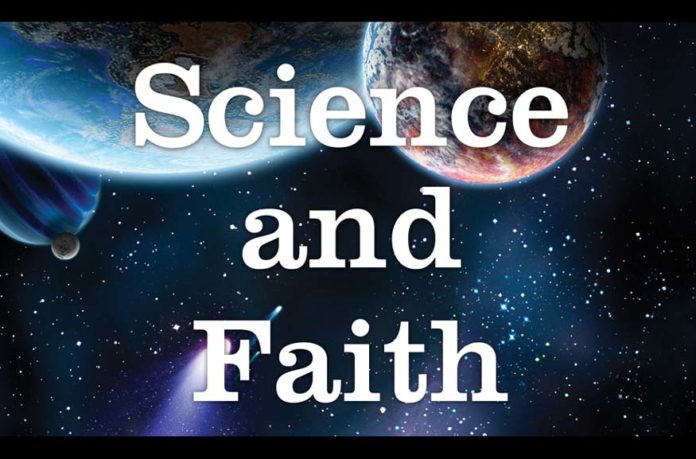Home Articles Science and Faith: Defining their Separate Spheres
Science can be described as knowledge gained systematically through observations and experience gained through sensory perception which provides a rational-material explanation of continuity and change in the universe. It is directed at understanding the processes underway in animate and inanimate objects. Such knowledge can give birth to technology with which these processes can be manipulated to generate change in productivity and thus serve as the engine for societies to move out of from a natural state of existence into civilisation based on the production of goods and values on an increasing scale. How those good and values are shared in society is the concern of political economy and political science which studies power exercised by governments, states, and international actors.
Let me state the obvious: natural sciences are the highest level of scientific achievement. The structure of science is constituted by a hypothesis, testing of it, evidence, discovery of laws and theorisation. Its procedures and norms are clearly laid down and the practitioners of science adhere to them in their research. According to one view, natural science is conducted within paradigms. A paradigm is a whole set of assumptions, conventions, norms and procedures of testing and verifying truth-claims of science according to which research is conducted. If a reigning paradigm can deliver answers and solutions to new problems that crop up during research scientists adhere to it and conduct research.
For example, Darwin’s theory of evolution is accepted by an overwhelming majority of scientists and is the standard framework for those who research biology. On its details, some modifications have been proposed but it remains the standard paradigm. Normal science or research in biology takes place according to those inter-subjective criteria on which there is a virtual consensus. By that I mean its practitioners agree on what sort of evidence is permissible and what procedures are required to test hypotheses. Nevertheless, a tiny minority of scientists subscribe to what is known as the creationist theory based on the rulings of sacred texts of different religions. Some populist and revisionist versions of the creationist theory rely on intelligent design theory which seeks to accommodate evolution with religious belief. The argument is that evolution is progressive but also teleological — that is that it moves in a predetermined direction which is consistent with the end-of-time fixed by Providence. The intelligent design theory enjoys wide support among educated believers of religions.
For science to continue to provide knowledge important for matters related to life on earth, it is important that society is based on scepticism rather than certainty. Let certainty of religion cater for the urge for salvation which is important for believers.
Similarly, in physics, the reigning paradigm is Einstein’s theory of relativity. However, Newton’s theory of gravitation which was the first major revolution in physics has not been abandoned altogether; rather its scope is now limited to understanding processes taking place on earth where gravitation continues to inform technology, while for studying the universe and the processes underway in it the theory of relativity is now the standard paradigm. In science, a theory is true until proven wrong. Therefore, its truth-claims are not absolute claims though constant testing of the theory may verify its truth-claims and if that happens on a recurring basis it remains the paradigm through which science is conducted in that field.
Science is a systematic way of categorising knowledge and processes which can be tested empirically. Faith, beliefs and religion are neither systematic, nor can be tested empirically. People who make truth-claims based on the authority of religion or religious texts do not consider objective, verifiable material evidence as imperative to prove their point. They rely on the inerrancy of revealed truth and on that basis argue their case for and against a proposition. Thus, for example, discussions and debates during the medieval period among both Christians and Muslims were primarily about doctrines and dogmas related to faith and belief. In such debates the participants displayed their skills and mastery in invoking sacred or religious authority; such debates rejected material facts as permissible evidence to establish the truth claim they made. Such reasoning and its rules of evidence are known as scholasticism. Imam Ghazali (died 1111) was a typical scholastic scholar who argued that revelation is superior to reason and therefore in case of conflict between the two, revelation must prevail. Among Muslims scholasticism is the main form of philosophical reflection. For example, the great poet-thinker Allama Iqbal (died 1938) argued his case for the superiority of spirituality over materialism and therefore of revelation over reason.
Scholasticism has largely been supplanted by pure reason and fact-based evidence as the mode of reasoning in the West. Under the cumulative impact of the Renaissance, the scientific and industrial revolutions and the enlightenment the authority of the Bible was supplanted by science. Henceforth verifiable evidence comprising material facts became the hallmark of scientific truth-claims. Understandably such developments generated considerable anxiety in society. Such a crisis was handled satisfactorily by demarcating the distinct spheres of science and religion. The general arrangement which was established was to let religion concern itself with spiritual matters based on faith, while social and material matters are studied unfettered by religious authority. Instead, logical reasoning and material evidence are used to advance the frontiers of knowledge about these two spheres of life.
For science to continue to provide knowledge important for matters related to life on earth, it is important that society is based on scepticism rather than certainty. Let certainty of religion cater for the urge for salvation which is important for believers. On the other hand, scepticism about how to organise social life and social and political relations must be left open to reason and material evidence. Social science no doubt cannot make predictions like the natural sciences which are conducted under controlled conditions such as in a laboratory. Human will, and human nature cannot be anticipated with the same certainty as the objects of study of natural sciences: inanimate matter. Nevertheless, fairly reliable knowledge can be produced through a systematic and scientific study of individual, social, national and international relations.
Psychology, economics, sociology and several other disciplines have generated information and knowledge which have been crucial to challenge racism, gender inequality and other social evils. It is important that society learns to accept the authority of rational sciences to bring about change and progress. By progress, I mean a worldview and world order which upholds pluralism, egalitarianism, the rule of law and an open society. Unless we do that, we will continue to tolerate prejudices and social and economic inequality as some sort of natural and predetermined phenomena. Experience from the more successful societies demonstrates unambiguously that societies which are based on doubt and skepticism about ultimate and absolute truths progress while those based on certainty stagnate and regress.
About the Author:

Dr. Ishtiaq Ahmed is Professor Emeritus of Political Science, Stockholm University; Visiting Professor Government College University and Honorary Senior Fellow, Institute of South Asian Studies, National University of Singapore. He can be reached at billumian@gmail.com









Good read, but I beg to differ with the statement “Allama Iqbal argued his case for the superiority of spirituality over materialism and therefore of revelation over reason.” In my opinion, spirituality over materialism doesn’t equal revelation over reason, the logic here is flawed although I’m not a big fan of Iqbal.